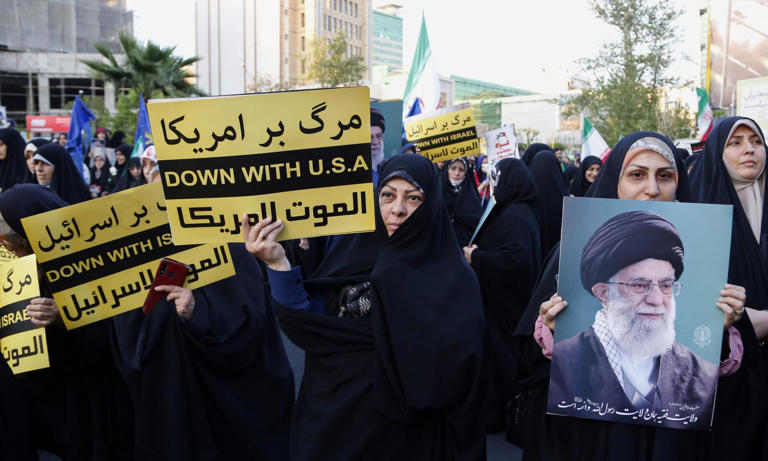 The US and the EU are considering rapid new sanctions against Iran in the wake of Tehran’s large-scale air attack on Israel at the weekend.
The US and the EU are considering rapid new sanctions against Iran in the wake of Tehran’s large-scale air attack on Israel at the weekend.
As Israel’s war cabinet met for a third day in a row to consider its response to the Iranian assault, which was launched in retaliation for Israel’s strike on an Iranian diplomatic facility in Damascus, Syria, on 1 April, international pressure was mounting on Israel to avoid steps that would lead to a regional conflict.
The Israeli government has told Washington that it will carry out a response but that response will be calibrated to limit further escalation. Any direct attack on Iranian territory would be further complicated by US refusal to participate and the likely reluctance of Israel’s Arab neighbours to allow its planes to flight over their territory.
In prepared remarks on Tuesday, the US treasury secretary, Janet Yellen, said Washington would use its sanctions authority and work with allies to “continue disrupting the Iranian regime’s malign and destabilising activity”.
Yellen’s comments were echoed by the German foreign minister, Annalena Baerbock, who announced she was travelling to Israel for discussions on how to prevent an escalation of tensions in the region. Baerbock said she had noted a European appetite for quickly expanding sanctions against Tehran, perhaps within days.
With senior Israeli officials promising a response to the Iranian airstrikes, governments – including that of Germany – who are keen to avoid a dangerous escalation have increasingly talked up new international sanctions.
One potential target for expanded sanctions, officials have suggested, was widening the scope of those involved in Iran’s production of drones, which were used in this weekend’s attack and have also been widely used against Ukraine by Russia.
On Monday, the Israeli military chief, Lt Gen Herzi Halevi, said Israel was considering its next steps but that the Iranian strike “will be met with a response”, while the army’s spokesperson, Rear Adm Daniel Hagari, said Israel would respond “at the time that we choose”.
Israeli analysts have suggested, however, that the longer Israel’s delay in responding, the less significant it is likely to be.
The Iranian attack, launched overnight on Saturday, occurred as Israel was already fighting on two fronts, against Hamas in Gaza and around the Lebanese border with the Iranian ally Hezbollah.
Under strong international pressure over the high civilian death toll in Gaza, where more than 85% of the population has been displaced and agencies have been warning of famine, the Iranian strikes – during which most of the missiles and drones were shot down – marked a worst-case scenario in international efforts to stop the war spreading.
Iran has tried to signal that the attack was a limited and justified response to the Israeli attack on its consulate on 1 April – in which two generals died – most recently on Tuesday in a phone call between the Russian president, Vladimir Putin, and Iran’s president, Ebrahim Raisi. The Kremlin said Raisi told Putin that Tehran’s strikes on Israel were limited and that the Islamic Republic was not interested in escalating.
Commenting on the prospect of sanctions, Baerbock said she had noticed that a number of players at the European level had said they would take another look at extending an existing EU sanctions regime against Iran that targets drone production.
“I hope that we can now finally take this step together as the EU,” she said in Berlin on Tuesday.
Baerbock’s comments came as Yellen suggested Washington could also expand its sanctions regime against Iran.
Yellen said Washington was continuing to use economic tools to pressure Hamas, but said the treasury was emphasising that its sanctions should not impede life-saving aid to Gaza. “It is incumbent on all of us here at these meetings to do everything in our power to end this suffering,” she said.
According to a report by the Axios news site, Yellen will press fellow international finance ministers – visiting Washington for the annual spring IMF meetings this week – to focus their governments on possible coordinated sanctions.
In Gaza, residents reported that Israeli tanks had pushed back on Tuesday into some areas of the northern Gaza Strip that they had left weeks ago. Warplanes conducted airstrikes on Rafah, the Palestinians’ last refuge in the south of the territory, killing and wounding several people, medics and residents said.
Residents reported an internet outage in the areas of Beit Hanoun and Jabaliya in northern Gaza. Tanks advanced into Beit Hanoun and surrounded some schools where displaced families had taken refuge, said the residents and media outlets of the militant Palestinian group Hamas.
“Occupation soldiers ordered all families inside the schools and the nearby houses where the tanks had advanced to evacuate. The soldiers detained many men,” one resident of northern Gaza told Reuters via a chat app. (The Guardian)


Post a Comment